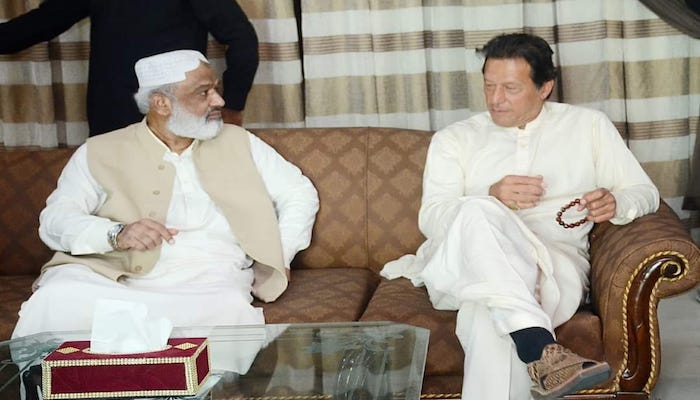PTI’s mission in Sindh: Is Arbab Rahim the right choice?
PM Imran Khan has appointed former Sindh CM Arbab Rahim as his special assistant on Sindh affairs
July 30, 2021

The decision of Prime Minister Imran Khan to appoint Dr Arbab Ghulam Rahim, former chief minister Sindh, who is also from one of the most remote areas of the province, Tharparkar, as his special assistant on Sindh affairs may not work out for more than one reason.
In the past, Rahim has failed to organise his own party, as well as the parties he joined, including Pakistan Muslim League – Nawaz. Nor does he have a very successful record as chief minister, from 2004 to 2007, under former president General (retired) Pervez Musharraf.
Unfortunately, anti-Pakistan Peoples Party (PPP) politics in Sindh, particularly in rural Sindh, revolves around a few heavy-weight families and groups, none of whom have been able to make any inroads in PPP’s strongholds.
Read more: Former Sindh CM Arbab Ghulam Rahim joins PTI
Instead of bringing new faces to the fore, the centre ruling PTI seems to be going for tested faces.
So far, PTI’s strategy in Sindh has been lacklustre. It has tried to make an attempt in Sindh through people like the late Mumtaz Ali Bhutto, Liaquat Jatoi, Nadir Akmal Leghari and even Haleem Adil Sheikh but without much success.
Perhaps, Dr Zulfiqar Mirza or his wife Dr Fahmida Mirza would have been a better choice from an anti-PPP perspective. Their son, Hasnain Mirza, is also politically active. Furthermore, the family belongs to PPP's stronghold, Badin. They could have been the right match to counter former President Asif Ali Zardari.
By appointing Rahim, Khan seems to be hoping to gain a vote bank in rural Sindh, as the party already has 14 MNAs and 23 MPAs from urban Sindh, mainly from Karachi. Whether they are able to retain their seat in 2023 is another debate.
But, it is also important to remember that in the 2018 election, the PTI gained in urban Sindh because of the then MQM’s founder Altaf Hussain’s controversial speech on August 22, 2016. The MQM could not recover since then and as a result got four seats in 2018 down from 18 in 2013.
Read more: Arbab Rahim alleges Umerkot by-polls were rigged
For any strategy to work, Prime Minister Khan and the PTI will need to understand the political dynamics of Sindh.
But, first let’s have a brief look at why PPP still has a firm grip both in power and over politics in Sindh.
The Sindhi people are politically conscious and also nationalists at heart. Many of them are not satisfied with Pakistan People’s Party and its government's performance, but they don’t see an alternative.
They backed Zulfiqar Ali Bhutto not merely because he was Sindhi but because he uplifted Sindh’s middle class during his tenure.
In all likelihood, Bhutto would have swept the national poll had it been held in October 1977 by General Zia ul Haq. His execution, in what regarded as a judicial murder, left such a deep impact on Sindh that for many years thereafter voters voted for PPP because of Bhutto’s sacrifice.
Since the 1970s, no one has been able to challenge the PPP’s hold over Sindh. Why? One reason is that the challengers, or the anti-PPP politicians in Sindh, have only tried to grab power with the blessings of the establishment, instead of making serious inroads by understanding the political dynamics in the post Zulfiqar Ali Bhutto era.
The only party which had the potential and could have challenged PPP politically was the Awami Tehreek of late Rasool Bux Palijo for the simple reason that it had organized wings, from women to peasants.
Its leaders and workers had given sacrifices during the 1980’s Movement for the Restoration of Democracy and earlier during the journalist’s movement.
PS-52: Lost Umerkot by-polls because of Prime Minister Imran Khan, says Arbab Rahim
Palijo was a very powerful orator both in Sindhi and Urdu, but he damaged his politics by confining it to rural Sindh instead of broadening its image at the national level.
He also developed differences with his son, Ayaz Palijo.
A month before his father’s death, I along with colleagues, Owais Tohid, Nazish Brohi and Dr. Ayub Sheikh went to see him to inquire about his health. During the conversation, I asked him why he could not settle his differences with his son and he said: My son “has disappointed me. He is now playing into the hands of those who matter.”
Then, there was the Functional Muslim League which also failed in Sindh because the late Pir Pagaro had serious political differences with Zulfiqar Ali Bhutto. Also, the famous Hur attack case was still fresh in the memory of PPP supporters. Besides, Bhutto’s execution also deepens these differences.
To date, the most serious effort to win over Sindh had been made by former Prime Minister Nawaz Sharif when it launched the “Forward Looking Sindh” movement, during which they not only backed some Sindhi politicians but also tried to win over Sindhi intellectuals, writers, journalists and even made huge investment in the media.
But that, too, eventually did not triumph.
The PTI’s dilemma in Sindh for over 20 years has been its complete failure to have a strategy.
Rather than Rahim, perhaps foreign minister Shah Mahmood Qureshi would have been a better choice to preside over Sindh’s politics.
How much support Arbab Rahim gets from within PTI is yet another problem.
The "old win in a new bottle” formula has failed in the past in the province and is unlikely to succeed now.
Abbas is a columnist and analyst at GEO, The News and Jang. He tweets @MazharAbbasGEO











